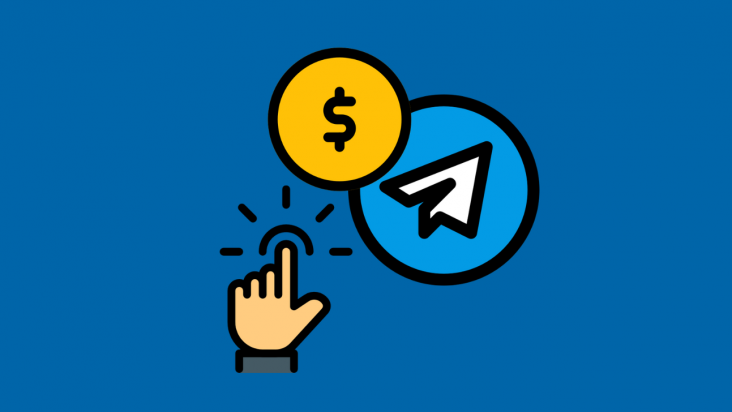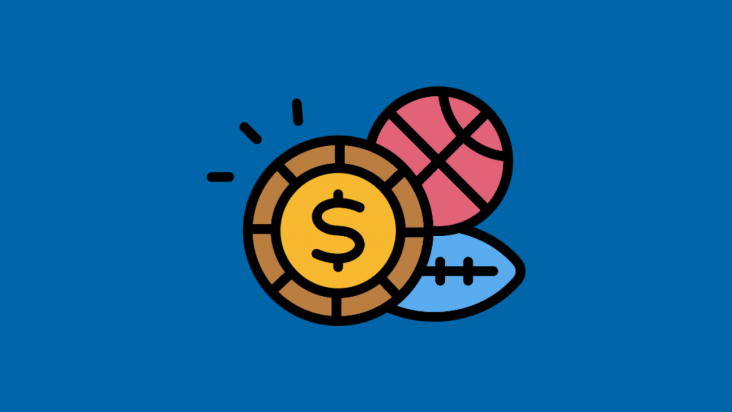
The year 2020 was an unprecedented one for the global community, marked by challenges and changes in every sphere of life, including the way we entertain ourselves. Amidst this backdrop, video games stood out as beacons of escapism, connection, and joy for millions around the world. The best-selling games of 2020 reflect a wide array of genres and platforms, catering to diverse gaming tastes and preferences. From immersive battle royales and strategic MOBAs to innovative social simulations and engaging puzzle games, the top titles of the year offered something for everyone.
| Rank | Game | Genre | Developer | Publisher | Platform | Release Date | |
|---|---|---|---|---|---|---|---|
| 1 |  | Battle royale | PUBG Studios | Tencent / Bluehole | Windows, Android, iOS, Xbox One, PlayStation 4, Stadia, Xbox Series X/S, PlayStation 5 | December 20, 2017 | |
| 2 |  | MOBA | TiMi Studio Group | Level Infinite, Garena | Android, iOS, iPadOS, Nintendo Switch | October 12, 2016 | |
| 3 |  | GCS / MMO | Roblox Corporation | Roblox Corporation | Windows, macOS, iOS, Android, Xbox One, Meta Quest 2, Meta Quest Pro, PlayStation 4 | September 1, 2006 | |
| 4 |  | Battle royale | Garena | Garena | Android, iOS, iPadOS | December 8, 2017 | |
| 5 |  | Social simulation | Nintendo EPD | Nintendo | Nintendo Switch | March 20, 2020 | |
| 6 |  | Augmented reality | Niantic | Niantic / Nintendo | iOS, Android | July 6, 2016 | |
| 7 | 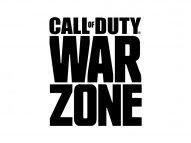 | FPS / Battle royale | Raven Software Infinity Ward | Activision (Activision Blizzard) | PlayStation 4, Windows, Xbox One | March 10, 2020 | |
| 8 | 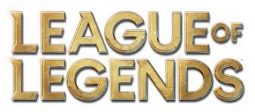 | MOBA | Riot Games | Riot Games / Tencent | Microsoft Windows, macOS | October 27, 2009 | |
| 9 |  | Puzzle | King | King (Activision Blizzard) | App Store, Google Play, Windows, Phone Store, Windows, macOS, Linux | April 12, 2012 | |
| 10 |  | RPG | Lilith Games | Lilith Games | Android, iOS | April 9, 2019 |
Best selling video games in 2020
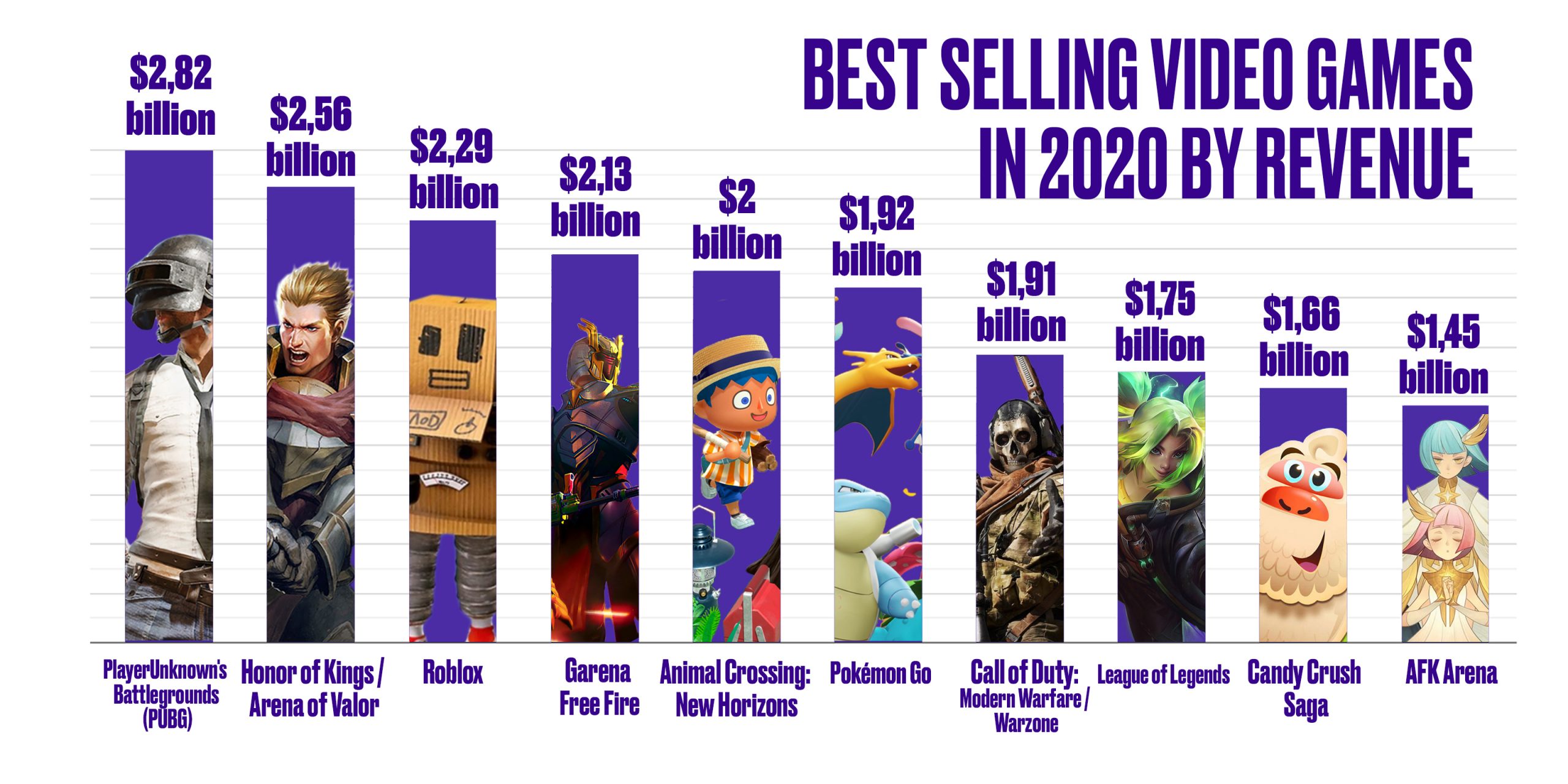
In 2020, the video game industry saw unprecedented financial success, with the top ten titles each generating over $1 billion in revenue, highlighting the expansive growth and global appeal of digital gaming. Remarkably, the elite tier of this list, comprising the top four games, each surpassed the $2 billion revenue mark, showcasing their dominant position in the market. A significant portion of this success can be attributed to Asian publishers, particularly the Chinese powerhouse Tencent, which claimed the top two positions. This trend underscores the strategic innovation and market penetration achieved by Asian companies in the gaming sector. The criteria for this ranking are based on global revenue generated, which includes game sales, in-game purchases, subscriptions, and other monetization strategies, reflecting the comprehensive commercial impact of these titles within the industry.
1. PlayerUnknown’s Battlegrounds (PUBG)

- Revenue: $2,824,000,000
- Publisher: Tencent / Bluehole
- Genre: Battle royale
- Platform: Various
- Business Model: Free-to-play / Buy-to-play
PUBG catapulted the battle royale genre to unprecedented heights with its intense, survival-based gameplay. Players parachute onto a deserted island, scavenging for weapons and equipment in a shrinking play zone, with the ultimate goal of being the last person standing. The game is renowned for its realistic physics, vast open-world environments, and adrenaline-pumping action. While PUBG doesn’t have characters in the traditional sense, players can customize their avatars with various skins and outfits. Its popularity stems from the high stakes and unpredictability of each match, combined with the social aspect of teaming up with friends. Notable collaborations included partnerships with movies and television series like Godzilla vs. Kong and The Walking Dead. These collaborations often featured limited-time events where players could earn themed skins and in-game items, merging pop culture with gaming in a way that appealed to a broad audience.The thrill of outsmarting and outlasting dozens of other players provides a uniquely rewarding experience.
2. Honor of Kings / Arena of Valor

- Revenue: $2,564,000,000
- Publisher: Level Infinite, Garena
- Genre: MOBA
- Platform: Mobile
- Business Model: Free-to-play
Honor of Kings, known internationally as Arena of Valor, is a MOBA game that brings fast-paced, strategic 5v5 battles to the mobile platform. Players choose from a vast roster of heroes, each with unique abilities and roles, such as tanks, assassins, mages, and marksmen. The objective is to work with your team to destroy the enemy’s core, navigating through lanes and jungles while battling enemy heroes and AI-controlled units. Honor of Kings has engaged in cross-promotions with popular media properties to attract fans.For example, the game featured characters from the TV series “Game of Thrones” and partnerships with anime series, integrating popular cultural elements which resonated well with the players.The vibrant community and regular updates with new heroes and features have kept players engaged worldwide.
3. Roblox

- Revenue: $2,290,000,000
- Publisher: Roblox Corporation
- Genre: GCS / MMO
- Platform: Various
- Business Model: Free-to-play
Roblox isn’t just a game; it’s a platform that allows users to create, share, and play games (referred to as “experiences”) made by other users, making it a vast universe of user-generated content. Players can jump into countless experiences, ranging from simple obstacle courses (Obbys) to complex simulations and role-playing games. The characters you meet are as diverse as the games themselves, each created and customized by individual players. Roblox’s popularity can be attributed to its limitless creative potential, empowering players to not just play games but also create their own worlds. The platform’s social features, such as friend systems and chat, along with its cross-platform compatibility, have made it a favorite among younger gamers and aspiring game developers alike. Moreover, Roblox has partnered with major brands and artists to create unique experiences within the platform. For example, game collaborated with Gucci to create an immersive virtual garden that allowed players to explore and purchase exclusive Gucci-branded virtual items. And also hosting virtual concerts with artists like Lil Nas X and Zara Larsson, which drew millions of participants to the platform for unique, real-time events.
4. Garena Free Fire

- Revenue: $2,130,000,000
- Publisher: Garena
- Genre: Battle royale
- Platform: Mobile
- Business Model: Free-to-play
Garena Free Fire is a mobile battle royale game that captures the essence of survival and strategy in fast-paced 10-minute rounds. Players parachute onto an island and must scavenge for weapons and equipment while staying within the safe zone that continuously shrinks. The game stands out for its character system, where players can choose from a variety of characters, each with their unique abilities, such as healing speed boosts or increased damage. The accessibility of the game on lower-end mobile devices, combined with its quick match times, has made it incredibly popular. Its success is also due to the frequent updates, new content, and the vibrant, competitive community it has fostered. Free Fire has collaborated with major international celebrities to boost its brand appeal such as DJ Alok, Cristiano Ronaldo (a character named “Chrono”), Hrithik Roshan (a character named “Jai”). The partnership with Netflix’s Money Heist let to create event called “Plan Bermuda” featured themed missions and in-game items based on the hit series, enhancing player engagement through well-known cultural content.
5. Animal Crossing: New Horizons

- Revenue: $2,000,000,000
- Publisher: Nintendo
- Genre: Social simulation
- Platform: Nintendo Switch
- Business Model: Buy-to-play
Animal Crossing: New Horizons for the Nintendo Switch offers players a unique escape to a deserted island, which they can then transform into their personal paradise. The game is filled with charming characters like Tom Nook, Isabelle, and the ever-changing roster of animal villagers, each with their unique personalities and styles. Players engage in activities like fishing, bug catching, and decorating their island, with the real-time clock and seasons providing a dynamic and ever-evolving gameplay experience. Since the game was released at the very beginning of the pandemic in 2020, the advertising company was aimed at an online audience.Nintendo hosted in-game events that allowed players to celebrate occasions like weddings, birthdays, and other gatherings virtually at a time when many were isolated at home. Public figures and celebrities, including Brie Larson and Elijah Wood, shared their experiences with the game on social media. Collaborations with brans such as Uniqlo (a clothing line featuring Animal Crossing designs), Puma (a special edition sneaker), IKEA (a special catalog themed around the game, showcasing how real-life furniture) brought the game worldwide popularity.
6. Pokémon Go

- Revenue: $1,920,000,000
- Publisher: Niantic / Nintendo
- Genre: Augmented reality
- Platform: Mobile
- Business Model: Free-to-play
Pokémon Go continued its global dominance in 2020 by blending the physical and digital worlds through augmented reality. Players explore their real-world surroundings to catch Pokémon, battle in gyms, and participate in raids. The game features iconic characters from the Pokémon series, like Pikachu, Charizard, and Mewtwo, among others. Its popularity is rooted in the nostalgia of the Pokémon franchise, coupled with the innovative AR gameplay that encourages physical activity and exploration. To attract new players was added Pokémon Go’s Adventure Sync feature, which allows the game to track walking distance even when the app is closed, was promoted as a health benefit, encouraging players to be physically active.The game got worldwide popularity due to collaboration with Starbucks (a special Pokémon GO Frappuccino), McDonald’s (restaurants served as Gyms and PokéStops), UNIQLO (a Pokémon-themed clothing line).
7. Call of Duty: Modern Warfare / Warzone

- Revenue: $1,913,000,000
- Publisher: Activision (Activision Blizzard)
- Genre: FPS / Battle royale
- Platform: Various
- Business Model: Buy-to-play / Free-to-play
Call of Duty: Modern Warfare / Warzone brought an intense, gritty, and realistic first-person shooter experience to gamers. In Modern Warfare, players engage in a riveting single-player campaign that explores the gray areas of modern warfare and partake in fast-paced multiplayer battles. Characters like Captain Price and Alex became iconic figures, embodying the game’s narrative depth and tactical nuance. Warzone, the battle royale counterpart, drops players into the expansive Verdansk, where they must scavenge for gear, complete contracts, and fight to be the last team standing. Its popularity soared due to the seamless integration of Call of Duty’s signature gunplay with the battle royale format, free-to-play model, and cross-platform play, making it accessible to a broad audience. For instance, Activision partnered with top gaming influencers and streamers to play Warzone, especially during launch and major updates. Influencers like Ninja, Dr Disrespect, and Shroud showcased the game to their extensive follower bases through sponsored streams. Brands like Mountain Dew and Doritos for cross-promotional deals that offered players in-game rewards, such as double XP, for purchasing promotional products.
8. League of Legends

- Revenue: $1,750,000,000
- Publisher: Riot Games / Tencent
- Genre: MOBA
- Platform: PC
- Business Model: Free-to-play
League of Legends (LoL) continued to dominate the MOBA scene with its strategic, team-based gameplay. Players choose from over 140 champions, each with unique abilities, and battle it out on the Summoner’s Rift with the goal of destroying the enemy Nexus. Iconic champions like Ahri, Yasuo, and Lux offer diverse playstyles, from magic-wielding mages to sword-swinging assassins. LoL’s popularity is underpinned by its deep strategic gameplay, constant updates, and a thriving esports scene. The game’s community, lore, and competitive nature have cemented its place as a staple in PC gaming, attracting players who enjoy teamwork, strategy, and a high skill ceiling. With the global pandemic impacting live events, Riot pivoted to virtual tournaments for their esports scene, notably the League of Legends World Championship, which was held in a bubble format in Shanghai. In 2020, Riot Games expanded its partnerships with Louis Vuitton (unique champion skins and a capsule collection of apparel featuring League of Legends themes), Spotify (an official esports music hub), Mercedes-Benz.
9. Candy Crush Saga

- Revenue: $1,660,000,000
- Publisher: King (Activision Blizzard)
- Genre: Puzzle
- Platform: Mobile
- Business Model: Free-to-play
Candy Crush Saga remained a juggernaut in the puzzle genre, captivating players with its simple yet addictive match-three gameplay. Players progress through levels by swapping colored candies to make matches, with various objectives and power-ups adding layers of strategy. Characters like Tiffi and Mr. Toffee guide players through the whimsical world of the Candy Kingdom, adding charm and narrative to the experience. Its widespread appeal lies in its accessibility, colorful graphics, and satisfying puzzle mechanics. The game’s success is also attributed to its presence on multiple platforms and integration with social media, allowing for a competitive yet cooperative experience as players compare scores and progress with friends.
10. AFK Arena

- Revenue: $1,450,000,000
- Publisher: Lilith Games
- Genre: RPG
- Platform: Mobile
- Business Model: Free-to-play
AFK Arena is an idle RPG where players assemble a team of heroes to battle against various foes, with the unique selling point being the game’s “AFK” (away from keyboard) feature, where heroes continue to fight and collect resources even when the player is not actively playing. The game features a diverse cast of characters drawn from various mythologies and original lore, each with unique abilities and backstories. Popular characters include the noble Lucius, the brave Belinda, and the cunning Nara. Its popularity is due to the ease with which players can progress, making it perfect for casual gaming sessions. The game’s art style, strategic depth, and regular updates with new heroes and events have also contributed to its broad appeal.
Gaming during Covid-19

The pandemic’s stay-at-home and lockdown mandates significantly boosted video game sales, as individuals increasingly sought entertainment in gaming. According to The NPD Group, there was a notable surge in video game sales in North America, with a 34% increase in March 2020 compared to March 2019. Additionally, video game hardware sales soared by 63%, with the Nintendo Switch console sales doubling. The first quarter of 2020 saw a 9% rise in net spending in the United States, reaching $10.9 billion, an unusual trend given the impending close of the eighth generation of video game consoles, largely attributed to pandemic conditions. By July 2020, total sales for video game hardware and software in the U.S. for the first half of the year hit $6.6 billion, marking the highest point since 2010, as reported by The NPD Group. Statista reports indicate a significant surge in global video game sales, with 4.3 million units sold in the week spanning March 16 to March 22. This marked a substantial 63% rise from the sales figures of the preceding week. Furthermore, when comparing identical titles, there was a 44% increase in sales, highlighting the growing reliance on video games as a source of entertainment during the challenging times of the crisis.
FAQ
The global pandemic played a significant role in the increase of video game sales throughout 2020. With stay-at-home orders and lockdowns in place, many turned to video gaming as a primary source of entertainment and social interaction. This shift in consumer behavior led to a remarkable 34% increase in video game sales in North America in March 2020 compared to the previous year. The demand for gaming hardware also saw a substantial rise, particularly for the Nintendo Switch console, which doubled in sales.
Asian publishers, with Tencent at the forefront, have shown exceptional prowess in capturing vast market segments with their diverse gaming portfolios. Tencent's strategic innovation, coupled with its ability to understand and cater to gamer preferences, allowed it to secure the top revenue spots. Their success is also attributed to their games' accessibility, engaging content, and effective monetization strategies, which resonated well with the global gaming community.
The pandemic-induced lockdowns created a unique demand for games that offered escapism, social connection, and comfort. This led to the popularity of various genres, from immersive battle royales like PUBG and Garena Free Fire, which provided intense, adrenaline-fueled escapism, to comforting social simulations like Animal Crossing: New Horizons, which offered a peaceful retreat and a means to connect with friends. Games that facilitated virtual social interactions or provided a sense of routine and normalcy became particularly significant during these challenging times.


